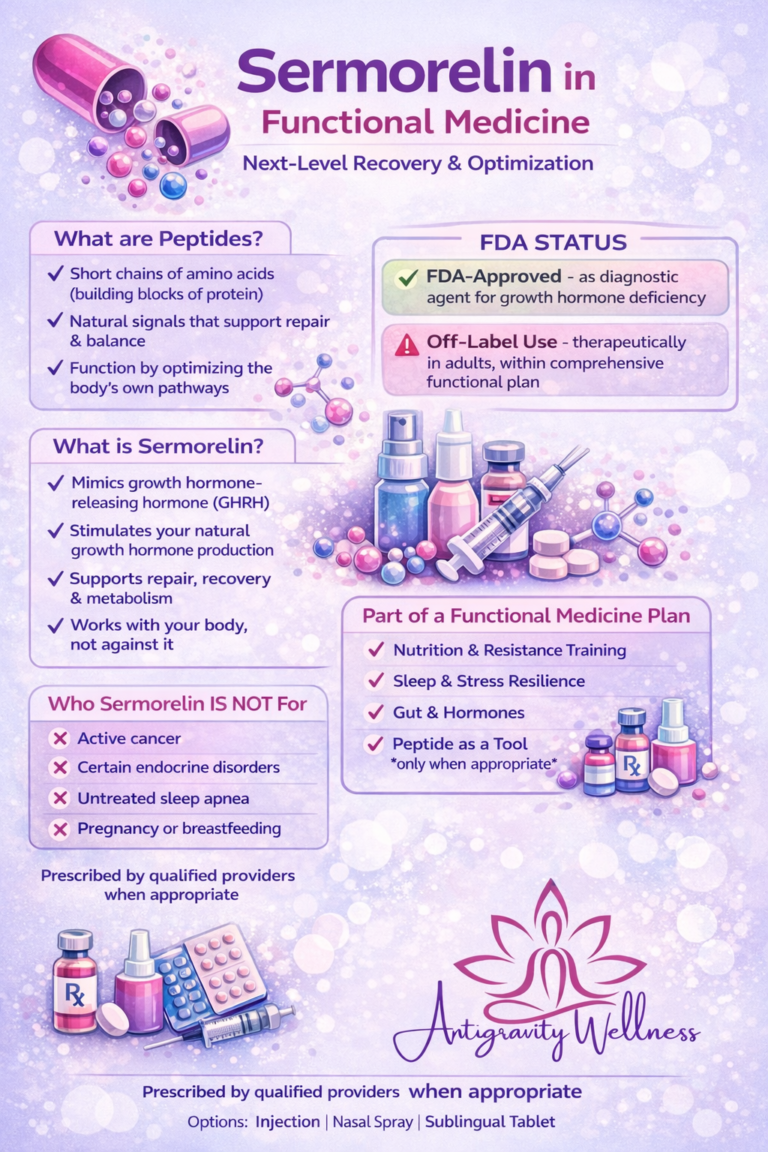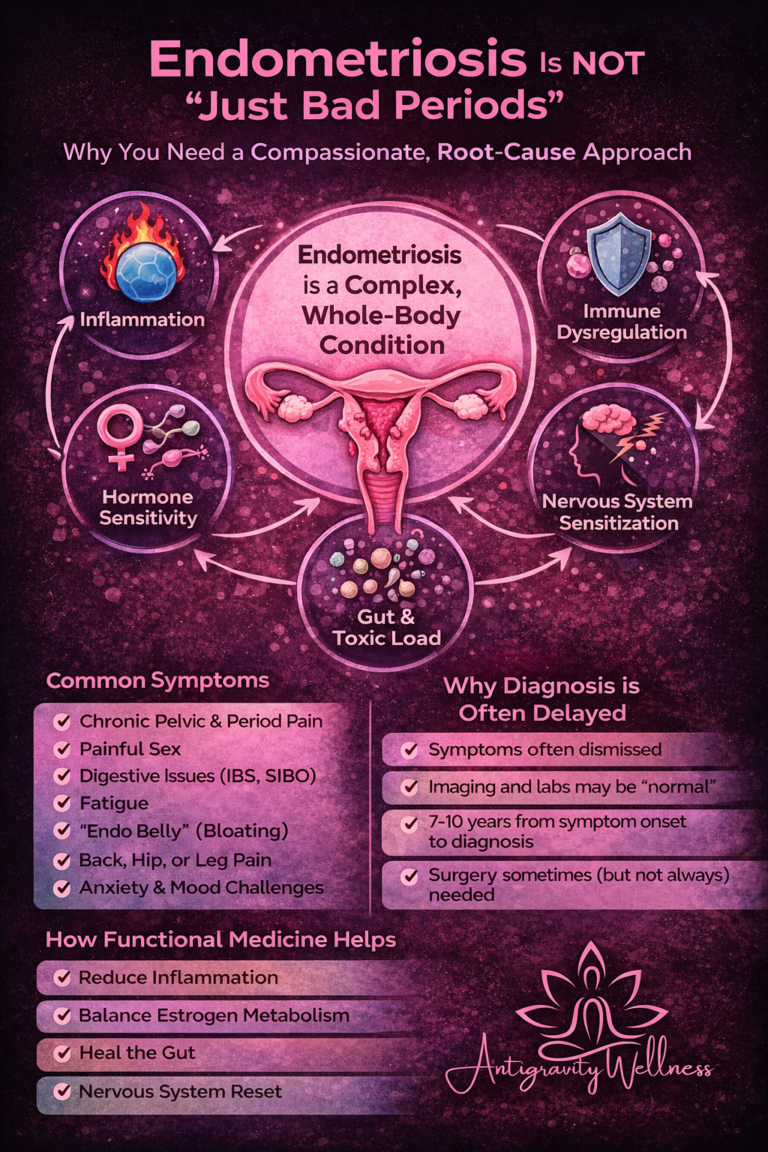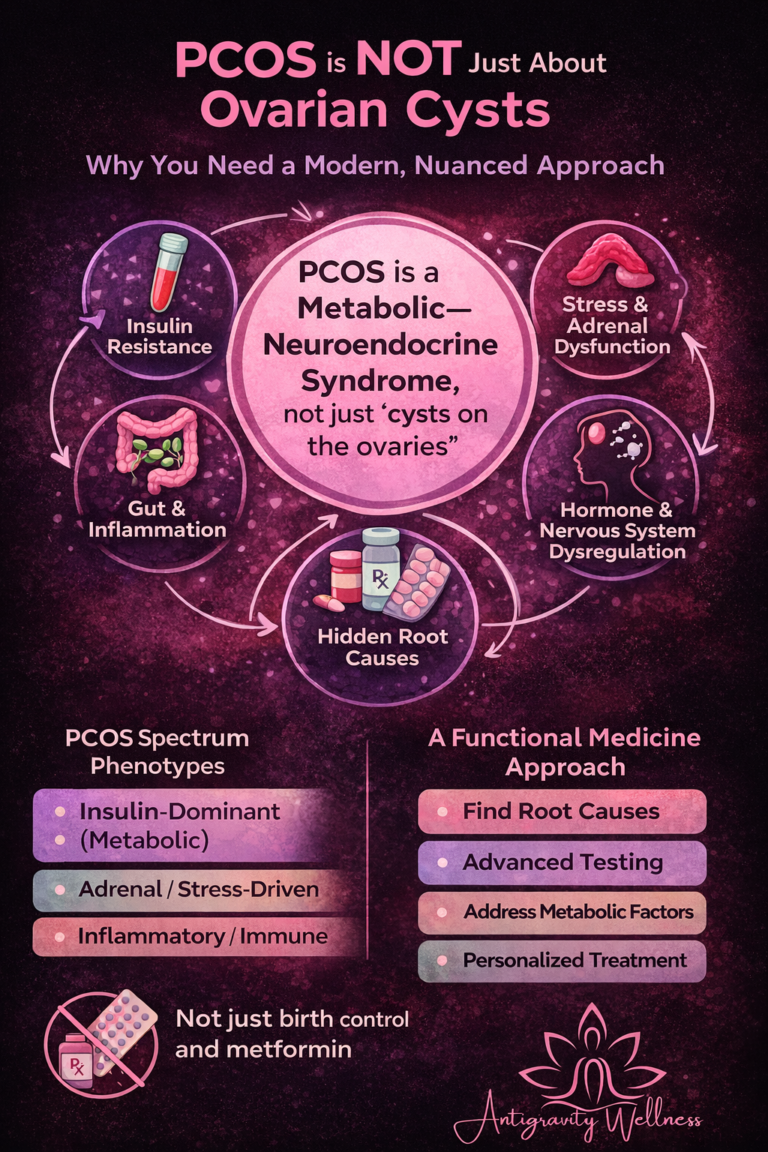Practical Strategies for Enhancing Intimacy and Sexual Health
Case Study: Jessica’s Story
Jessica is a 45-year-old mother of two who has always enjoyed a healthy sex life. But recently, she noticed a significant drop in her libido. This sudden change left her feeling frustrated and disconnected from her partner. Despite multiple visits to her primary care physician (PCP), Jessica didn’t receive the help she needed. Her PCP dismissed her concerns, attributing them to “just a part of getting older.”
How many women can relate to this? How many couples just accept the decline of their sex life as part of being in a long-term relationship? It doesn’t have to be this way. A healthy intimate relationship that is fulfilling and connects at a deeper level is part of mental and emotional well-being. The loss of libido is a sign of underlying imbalances that need to be addressed for overall health and well-being.
Understanding the Prevalence of Changes in Libido
Changes in libido during perimenopause and menopause are common. Studies show that about 50-70% of women experience a noticeable decrease in sexual desire during this time. Every woman is different, and these changes can vary widely. Some may have a significant drop in libido, while others may notice only minor changes. Understanding that you’re not alone can be the first step towards finding a solution.
The Emotional and Psychological Impact
A drop in libido can make you feel frustrated, confused, and even sad. It can affect how you see yourself and how you feel about your body. It can also put a strain on your relationship, making you feel distant from your partner. These feelings are normal, but they don’t have to be permanent. Addressing the emotional and psychological impacts of libido changes is important for your overall happiness.
What Causes Changes in Libido?
Several factors can cause changes in libido during perimenopause and menopause:
- Hormonal Fluctuations: Changes in hormones like estrogen, testosterone, and progesterone can affect sexual desire.
- Physical Changes: Vaginal dryness and pain during intercourse can make sex less enjoyable.
- Psychological Factors: Stress, mood swings, and depression can lower your libido.
- Lifestyle Factors: Poor sleep, diet, and exercise habits can also play a role. Some medications, like antidepressants and birth control, can affect libido too.
Effective Treatments for Libido Changes
Treating changes in libido requires a comprehensive approach:
- Medical Treatments: Hormone Replacement Therapy (HRT) and vaginal estrogen can help. Off-label treatments like testosterone therapy and certain antidepressants may also be beneficial.
- Herbal Remedies: Supplements like maca root, ginseng, and fenugreek can boost libido naturally.
- Diet and Nutrition: Eating a balanced diet rich in phytoestrogens, omega-3s, and antioxidants can support hormonal health.
- Exercise: Regular physical activity, including pelvic floor exercises, can improve libido.
- Lifestyle Changes: Managing stress, getting enough sleep, and building a support network are crucial.
When to Seek Help
If changes in libido are making you feel unhappy or affecting your relationship, it’s important to seek help. Persistent symptoms, emotional distress, or physical discomfort are signs that you should talk to a professional.
Who Can Help?
Several types of professionals can help address libido changes:
- Functional Nurse Practitioners: Experts like Dr. Nicole Smith specialize in holistic care for perimenopause and menopause.
- OB/GYNs: These doctors focus on women’s reproductive health.
- Endocrinologists: They are experts in hormone-related issues.
- Pelvic Floor Specialists: These physical therapists can help with pelvic health.
- Sex Therapists: They address emotional and psychological aspects of libido.
- Primary Care Providers: They can provide general health assessments and referrals to specialists.
Your Path to Rediscovering Libido
You don’t have to accept a decline in your sex life as just a part of aging or a long-term relationship. By understanding the causes and seeking the right treatments, you can rediscover a healthy, fulfilling libido.
Free Resource: Download our Libido Enhancement Checklist to track and manage changes in your libido. Join our Free Webinar on the Hormone Harmony Method for more insights and support.
For personalized consultations and treatment plans, book a FREE discovery call with Dr. Nicole Smith here.
Next recommended blog: Perimenopause Hormonal Changes.
Remember: Always consult with your healthcare provider before starting any new treatment or supplement regimen. This information is for educational purposes and is not a substitute for professional medical advice.
Rediscovering your libido is possible, and it starts with understanding, seeking help, and taking proactive steps towards better health and well-being.
References:
- Angel K. The history of ‘Female Sexual Dysfunction’ as a mental disorder in the 20th century. Curr Opin Psychiatry. 2010 Nov;23(6):536-41. doi: 10.1097/YCO.0b013e32833db7a1. PMID: 20802336; PMCID: PMC2978945. https://www.ncbi.nlm.nih.gov/pmc/articles/PMC2978945/
- The Australian Menopause Centre. The origin and evolution of female libido. https://www.menopausecentre.com.au/information-centre/articles/the-origin-and-evolution-of-female-libido/#:~:text=In%20the%2019th%20Century,their%20husbands%20desires%20at%20bay
- Davis, S.R., & Jane, F. Sex & perimenopause. Australian Family Physician Vol. 40, no. 5, May 2011. https://www.racgp.org.au/getattachment/7e0bf0c6-063a-4715-a034-578a00abf098/Sex-and-perimenopause.aspx
- Decameron Web. Sexual desire. Italian Studies Department’s Virtual Humanities Lab at Brown University. https://www.brown.edu/Departments/Italian_Studies/dweb/society/sex/sexual-desire.php#:~:text=Although%20popular%20opinion%20saw%20women,able%20to%20satisfy%20them%20adequately
- Examine.com Panax ginseng. https://examine.com/supplements/panax-ginseng/
- Fenugreek. Akay Bioactives. https://akaybioactives.com/product/fenusmart/
- Oh KJ, Chae MJ, Lee HS, Hong HD, Park K. Effects of Korean red ginseng on sexual arousal in menopausal women: placebo-controlled, double-blind crossover clinical study. J Sex Med. 2010 Apr;7(4 Pt 1):1469-77. doi: 10.1111/j.1743-6109.2009.01700.x. Epub 2010 Feb 5. PMID: 20141583. https://pubmed.ncbi.nlm.nih.gov/20141583/
- Rao A, Clayton P, Briskey D. Libifem® (Trigonella foenum-graecum) in conjunction with exercise on muscle strength, power, endurance, and body composition in females aged between 25 and 45 years. Front Sports Act Living. 2023 Aug 11;5:1207013. doi: 10.3389/fspor.2023.1207013. PMID: 37637219; PMCID: PMC10450923. https://www.ncbi.nlm.nih.gov/pmc/articles/PMC10450923/
- Shin BC, Lee MS, Yang EJ, Lim HS, Ernst E. Maca (L. meyenii) for improving sexual function: a systematic review. BMC Complement Altern Med. 2010 Aug 6;10:44. doi: 10.1186/1472-6882-10-44. PMID: 20691074; PMCID: PMC2928177. https://www.ncbi.nlm.nih.gov/pmc/articles/PMC2928177/#:~:text=1472%2D6882%2D10%2D44%2DS1.DOC%20
- Standeven, L., & Langhorne, O.J. Sex after menopause. John Hopkins Medicine. https://www.hopkinsmedicine.org/health/wellness-and-prevention/how-sex-changes-after-menopause#:~:text=Many%20people%20remain%20sexually%20active,make%20sexual%20activity%20less%20appealing
- Studd J, Schwenkhagen A. The historical response to female sexuality. Maturitas. 2009 Jun 20;63(2):107-11. doi: 10.1016/j.maturitas.2009.02.015. Epub 2009 May 31. PMID: 19487089. https://pubmed.ncbi.nlm.nih.gov/19487089/#:~:text=This%20medical%20contempt%20for%20normal,a%20disorder%20worthy%20of%20treatment
- Wolfman, W., Krakowsky, Y., Fortier, M. Guideline no. 422nd: menopause and sexuality. SOGC Clinical Practice Guideline. Volume 43, Issue 11, p. 1334-134. e1, Nov 2021. https://www.jogc.com/article/S1701-2163(21)00693-9/abstract#:~:text=4.,of%20transdermal%20testosterone%20or%20flibanserin




